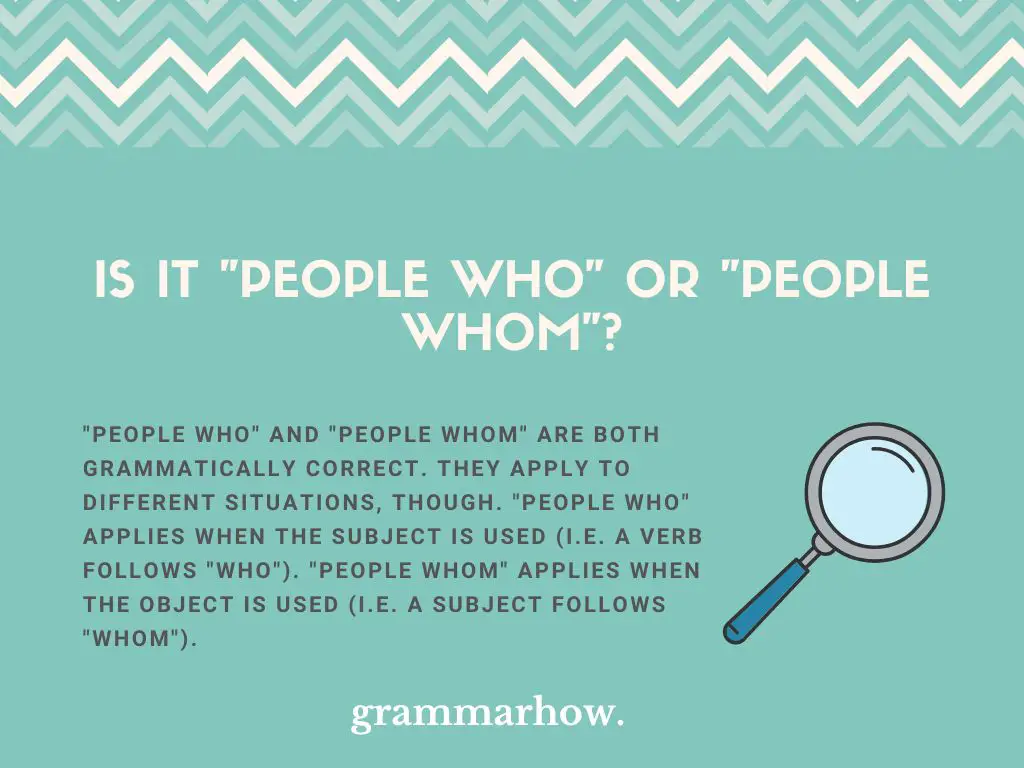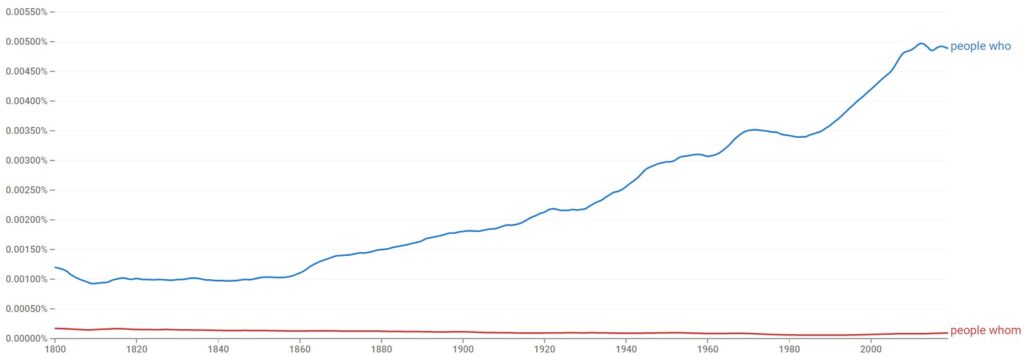“People who” and “people whom” are similar phrases, but they’re not identical. This article will explain all the differences you need to know about to make sure you’re using them correctly.
Is It “People Who” or “People Whom”?
“People who” and “people whom” are both grammatically correct. They apply to different situations, though. “People who” applies when the subject is used (i.e. a verb follows “who”). “People whom” applies when the object is used (i.e. a subject follows “whom”).

We can use the subject when a verb comes after “who,” showing how the subject does a task:
- People who helped
We can use the object when there is another subject available that might be affecting the object of “whom”:
- People whom he helped
Generally, “people whom” is only used for the most formal situations. If there’s a strict grammar rule that you’re sticking to, you might find “people whom” works. However, in other cases, “people who” is always better (and definitely the best choice informally).
If you’re struggling to know which form to use, you’re better off with “people who” in every case. Most people use “people who” interchangeably with “people whom,” so it makes more sense for it to work in most contexts.
According to Google Ngram Viewer, “people who” is the most popular choice. There is a large disparity between the two graph lines, showing that “people whom” is hardly ever used (even though it is technically correct in some situations).

People Who
“People who” is common when referring to the subject of the sentence. In this case, “who” is usually followed by a verb because it acts as a subject pronoun. It’s also more common to replace “whom” with “who” whenever it feels better to do so in your writing.
Many native speakers will use “who” as the object pronoun just as much as the subject pronoun. This allows them to use “people who” regardless of the context of the sentence.
- The people who trust me the most are in this room. I hope you can see them for who they truly are.
- All the people who gathered around for the party are outside. Don’t let them down again, man.
- The people who helped out are waiting for you. They want to know whether you’re okay with their performance.
- The people who voted for you chose to do so for a reason. Let them know it was worth it!
People Whom
“People whom” is not very common at all. While it is grammatically correct when referring to the object of the sentence, it is not something that many native speakers follow as a rule. You should only use it when another subject follows “whom” in a sentence.
Even when the requirement of having another subject is met, most people still avoid using “whom.” It sounds jarring and pretentious to many native speakers, so it’s best to stick with “people who” if you’re ever in doubt.
- The people whom he has asked do not know how to handle this situation. It’s best if you can help them out.
- The people whom the others are not fond of are listed here. You should be careful approaching any of them for a comment about this.
- The people whom we have had to let go are right in front of you. Hopefully, that’s going to be sorted out in no time.
- The people whom I have on my radar are all performing as expected. I’m excited to see how they get on.
People Which
“People which” doesn’t technically work as a standalone phrase. “People” refers to humans, but “which” refers to objects and items. “Who” and “whom” work since they both refer to “people” already, but “which” isn’t as suitable.
However, there are instances where “people which” is used, and you can refer to the following to understand it:
- I asked the people which of the two items they preferred looking at.
- I asked the people which one they wanted to learn more about. It was very interesting.
- He asked the people which one of them was going to be the most difficult to get done correctly.
- They asked the people which of the items listed was the most potent.
Final Thoughts
“People who” and “people whom” are both correct but for different reasons. “Who” works when we’re referring to the sentence’s subject, and it’s also the more common choice. “Whom” only works in the most formal situations when referring to the sentence’s object.
You may also like:
“Who Are You Staying With” or “Whom Are You Staying With”?
“Whom Should I Reach Out To” or “Who Should I Reach Out To”?
“Among Whom” or “Among Who”? Correct Version (With Examples)
“People Who” or “People That” – Correct Version Explained
People or The People – Which Is Correct? (Helpful Examples)

Martin holds a Master’s degree in Finance and International Business. He has six years of experience in professional communication with clients, executives, and colleagues. Furthermore, he has teaching experience from Aarhus University. Martin has been featured as an expert in communication and teaching on Forbes and Shopify. Read more about Martin here.
